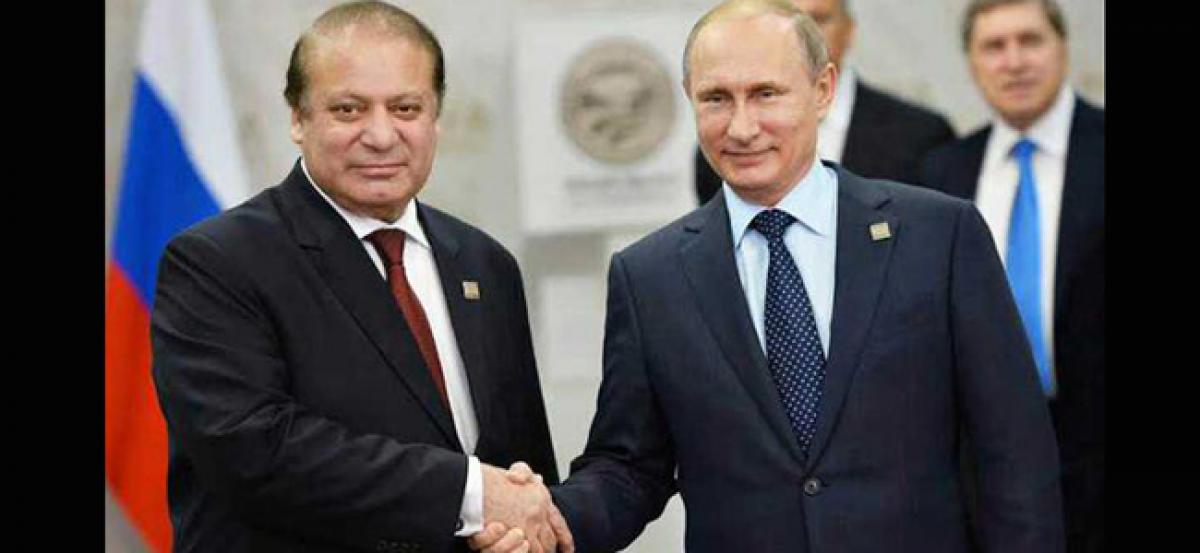Live
- Over 7,600 Syrians return from Turkiye in five days after Assad's downfall: minister
- Delhi BJP leaders stay overnight in 1,194 slum clusters
- Keerthy Suresh and Anthony Thattil Tie the Knot in a Christian Ceremony
- AAP, BJP making false promises to slum dwellers for votes: Delhi Congress
- 'Vere Level Office' Review: A Refreshing Take on Corporate Life with Humor and Heart
- Libya's oil company declares force majeure at key refinery following clashes
- Illegal Rohingyas: BJP seeks Assembly session to implement NRC in Delhi
- Philippines orders full evacuation amid possible volcanic re-eruption
- Government Prioritizes Welfare of the Poor, says Dola Sri Bala Veeranjaneyaswamy
- Two Russian oil tankers with 29 on board damaged due to bad weather
Just In

Pakistan has observed a \"change\" in the US\' diplomatic policy, marked by its closer ties with India -- which is the reason for Pakistan\'s burgeoning ties with Russia, Pakistan Prime Minister\'s special envoy on Jammu and Kashmir has said. Mushahid Hussain Syed, who is on a visit to the US, said, \"We (Pakistan) are observing a change in the US diplomatic policy.\"
Washington:Pakistan has observed a "change" in the US' diplomatic policy, marked by its closer ties with India -- which is the reason for Pakistan's burgeoning ties with Russia, Pakistan Prime Minister's special envoy on Jammu and Kashmir has said.
Mushahid Hussain Syed, who is on a visit to the US, said, "We (Pakistan) are observing a change in the US diplomatic policy."
Hussain said every action has a reaction, and Pakistan felt the need to develop close ties with Russia after President Barack Obama's two visits to India.
"This was the start of a new chapter in Pakistan-Russia ties," Hussain said, adding that Moscow is in favour of building a working relationship with countries of South Asia region, Dawn reported.
Accusing Obama of changing the policy for political gains, Hussain said the US State Department had refused to give visa to then Gujarat Chief Minister Narendra Modi in 2006, but it took a U-turn after Modi was elected as the Prime Minister.
"This U-turn of US policy can be traced back to the time of Bush administration, when the US-India nuclear deal was signed which was against the law of non-proliferation of nuclear weapons," said Hussain, at a programme organised by the think tank Atlantic Council here.
His remarks come as Pakistan and Russia held their first ever joint military exercises in Khyber Pakhtunkhwa province late last month. Pakistan has also inked a deal on purchase of four Russian Mi-35M attack helicopters. Pakistani army, navy, and air force chiefs have visited Russia, signalling an upswing in bilateral military ties.
"Stability of Afghanistan and eradication of terrorism is a top priority of the US, which needs Pakistan to play a role in the peace-process. Pakistan is not only providing its assistance in the peace process but also facing damages," he said.
Hussain, who submitted a "dossier containing evidence of the atrocities carried out by Indian forces in occupied Kashmir" to Special Assistant to President Barack Obama, Peter Lavoy on Friday, also asked for a probe into the September 18 terror attack on an Indian army camp in Uri, Jammu and Kashmir.
"UN military observer group for India and Pakistan should investigate the attack. Crossing the Line of Control to attack any target in India is not possible for any militant," he said.
He said that India should share with Pakistan if it has any evidence or intelligence regarding the attack, which left 19 Indian soldiers dead. India has blamed the attack on Pakistan based Jaish-e-Mohammad militant group.
The joint military exercises with Russia, which conclude on October 10, come amid tensions between Pakistan and India over the Uri attack and the "surgical strikes" by India on terrorist launch pads across the Line of Control in Jammu and Kashmir. Pakistan has denied the surgical strikes and said it was a cross border fire exchange in which two Pakistani soldiers were killed.
Hussain on Friday briefed Peter Lavoy about the situation in Kashmir Valley which has been gripped by violence since July 9, a day after the killing of top militant Burhan Wani in a clash with Indian security forces.
Hussain informed Lavoy about the "atrocities and human rights violations" in Kashmir, saying the Indian aggression has adversely impacted the security situation in South Asia.
He said the silence of the international community, especially the US, has proven to be dangerous for the security situation in the region.
"Kashmir issue is important. Without peace in Kashmir it is not possible to have peace in the region," he said.
"Pakistan has deployed 200,000 troops on the western border with Afghanistan to fight terrorists. If tension with India increased, Islamabad will have to shift troops to its eastern border," he said.
Hussain also said that India can not violate the Indus Waters Treaty, as the move would constitute an act of war.
"Apart from Pakistan and India, the World Bank is also a stakeholder in the treaty," said Hussain.
India has said it plans to revisit the 56-year-old river waters treaty in the wake of the Uri attack and worsening ties with Pakistan. Indian Prime Minister Narendra Modi said that "Blood and water can't flow together".

© 2024 Hyderabad Media House Limited/The Hans India. All rights reserved. Powered by hocalwire.com







